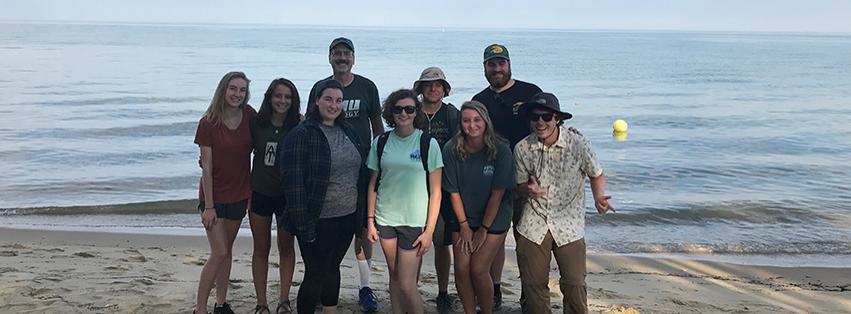
Attention Faculty!
We are looking for future staffing for the ENVT 400. For the first time, we are considering solo proposals for the ENVT 400 in addition to team-teaching proposals. Please take a look and see if this opportunity might not open up further pathways for your own scholarship and teaching. See ENVT 400 details for more information and the course proposal form.
Capstone Seminar in Environmental Problem Solving
The Capstone seminar of the Environmental Minors Program is a cross disciplinary team-taught course that provides students and faculty with a transformative educational experience. It is designed to facilitate and combine hands-on research projects, cross-disciplinary communication and teamwork, and opportunities for community service learning with intensive theoretical and methodological training, analysis and application. This capstone experience recognizes that environmental problems are complex and multifaceted, and that no single discipline or perspective can provide a society with the knowledge and tools that are necessary to understand, design and implement solutions to environmental problems. Thus, the seminar brings together students from each of the three different minor programs for a culminating experience.
Our seminar design reflects the reality that contemporary environmental research and decision-making requires sustained cross-disciplinary communication and teamwork. For this reason the course is team-taught by professors from different disciplines who will work together in the classroom for every session. While an occasional guest speaker might make an appearance, the substance of the course is generated by the collaborative conversation between the faculty in the classroom and students. The instructors of each course will design the course around a particular environmental topic. To facilitate intensive projects it is capped at 16 students.
Course Description
Integrates perspectives from three environment programs: Environmental Management, Environmental Science and Environmental Studies. The course is team taught using a case-study approach to environmental issues, emphasizing teamwork and student initiative. Topics vary. Prerequisites: Completion of 15 hours in declared environment minor or permission of instructor. Students wishing to complete more than one of the Environment minors (Environmental Studies, Environmental Science, Environmental Management) may receive dual credit for ENVT 400.
Previous Topics
- Learning, Consumption and Stewardship: Designing Human Use of the Natural World
- Team: Bayo Ogundipe (Ph.D. Environmental Engineering), Tim Thomas (Ph.D. Curriculum)
- Food Production, Processing and Consumption and Climate Change
- Team: Jennifer Coffman (Ph.D. Anthropology) and Wayne Teel (Ph.D. Agroforestry, Soil Science and International Agriculture)
- Water Quality: From the Valley to the Chesapeake Bay
- Team: Bruce Wiggins (Ph.D. Microbiology/Ecology/Environmental Toxicology) and Pete Bsumek (Ph.D. Rhetoric and Communication)
- Biocreativity
- Team: Debbie Sturm (Ph.D. Counseling and Supervision) and Patrice Ludwig (Ph.D. Biology)
- (The Costs of and Solutions to) Light Pollution
- Team: Paul Bogard (Ph.D. Literature and Environment) and Shanil Virani (Ph.D. Astrophysics)
- Environmental Disasters
- Team: Robert Brent (Ph.D. Environmental Science in Civil and Environmental Engineering) and Rob Alexander (Ph.D. Public Administration)
- Sustainability in the Valley
- Team: Dr. Maria Papadakis, JMU; Dr Jim Yoder, EMU; Dr. Joe Sprangl, Mary Baldwin College; Dr. Tim Kreps, Bridgewater College, and Dr. Maggie Marangione, Blue Ridge Community College.
- What is low energy input sustainable agriculture, and can it feed the planet?
- Team: Jennifer Coffman (Ph.D. Anthropology) and Wayne Teel (Ph.D. Agroforestry, Soil Science and International Agriculture)
- Mountaintop Removal in Appalachia
- Team: Bruce Wiggins (Ph.D. Microbiology/Ecology/Environmental Toxicology) and Pete Bsumek (Ph.D. Rhetoric and Communication)
- Water in the Valley
- Team: Christine May (Ph.D. Fisheries and Wildlife) and Georgia Polacek (Ph.D. Health Education (Health Promotion)
- Food for Thought: Food, Farming and Culture from Local to Global
- Team: Christie-Joy Brodrick Hartman (Ph.D. Transportation Technology and Policy) and Mary Handley (Ph.D. Plant Pathology)
- Feeding the Planet
- Team: Wayne Teel (Ph.D. Agroforestry, Soil Science and International Agriculture) and Katey Castellano (Ph.D. English)
- Mountaintop Removal in Appalachia
- Team: Bruce Wiggins (Ph.D. Microbiology/Ecology/Environmental Toxicology) and Pete Bsumek (Ph.D. Rhetoric and Communication)
- Biofuels and the Global Food Supply
- Team: Jennifer Coffman (Ph.D. Anthropology) and Steve Frysinger (Ph.D. Environmental Sciences)
